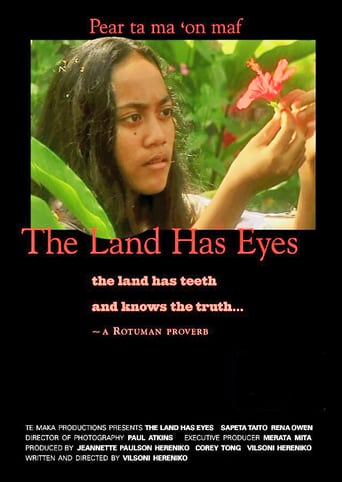Todd Mason
THE LAND HAS EYES will be offered in May 2006 (a few stations might jump the gun and run it in late April) as soft-fed item on PBS...it doesn't have a set place in the prime-time schedule, and thus even more than other PBS programming, stations have their own choice as to when to run it...so look for it particularly in the Saturday primetime hours, where American Public Television's syndicated film packages often run on stations, or call your station, of course, both to ask when they'll run it and to encourage them to consider it, if you wish. I suspect this maneuver might unnecessary at KHET Honolulu or KGTF Agana (Guam), but as we move away from the Pacific, there might or might not be a greater tendency to not worry too much about running such a film...as good as it might be (I haven't seen it).
roland-104
This film's title ("The Land Has Eyes" in English) is taken from a Rotuman saying, "The land has eyes and teeth and knows the truth." It reflects the conviction of the native population of Rotuma – a tiny island 300 miles north of Fiji - that in time wrongs will be righted, and bad deeds will be avenged. Meanwhile, one must be patient and live in harmony with others, even one's enemies. A highly pragmatic philosophy when everybody is stuck on a tiny patch of land and they're all related to one another to boot.Obtaining justice is an important subtext of this coming-of-age film, the first feature made by a Fijian native. The central character is a high school girl, Viki (Sapeta Sokagaito Taito, a 17 year old native Rotuman), who is smart and ambitious. Viki feels disrespected by her mother, who prefers to teach homemaking skills to Viki's older sister, not someone with the intellectual skills or backbone we see in Viki.But there is a certain wisdom in the mother's stance. Viki gravitates toward her father, aiding him in more physically demanding tasks like coconut harvesting. More importantly, by staying close to him she also comes to identify with her father's faithful adherence to traditional folkways and beliefs, as well as his frustration when he is unjustly convicted of a crime of theft that he did not commit.Unlike the young heroine in the Maori film, "Whale Rider," with which this film has much in common, Viki is not constrained by a misogynistic folk tradition that prohibits women from rising to strong community leadership roles. Indeed, the film opens with a reenactment of a Rotuman creation myth that shows the origin of the first ruler, Warrior Woman (played by Rena Owen, a Maori actress who starred in "Once Were Warriors").Still, Viki and her family must contend with the crooked Poto, the man who framed Viki's father and tries to manipulate local authorities to choose his nephew over Viki to receive a scholarship for further schooling in Fiji. Fulfilling the promise of the film's title, things do work out at the end, though there is need for some of Warrior Woman's magic to finally make things right.The screenplay, written by the director, is quite good, but the photography and editing are undistinguished, failing to evince much beauty in the tropical surroundings. The acting, apart from Ms. Taito's more than adequate turn, is also not first rate. The film is important, nonetheless, because it is a Fijian first and also because it provides a fascinating window into a culture most Westerners don't know. (In Rotuman & English) My rating: 6.5/10 (low B). (Seen on 04/16/05). If you'd like to read more of my reviews, send me a message for directions to my websites.
sahana1
The Land Has Eyes is a unique film, depicting the people and culture of a small island that is otherwise invisible to most of the world. The movie beautifully captures the nuances and rhythms of life on a Pacific island, showing the depth of village culture today. It weaves in the realities of modern-day life (children getting western education, etc) with an age-old conflict that could have happened in a village five hundred years ago.The writer and director, who is from Rotuma weaves in powerful themes to a simple story, such as that of female power and enduring justice, using elements from mythology. Most of the actors and actresses in the film are amateurs and they do a wonderful job of acting this first movie. I'd highly recommend this film for a glimpse into Rotuma's people and culture.
jtomyl
Saw the film at the first theatrical release in Honolulu. I was surprised at how many people were in the audience given the type of film (inde film with subtitles). The film quality at times wasn't great (grainey and exalted). There was a Q&A after the film and there were several other Polynesians in the audience that really identified with the film, growing up on a small island and looking forward to bigger adventures in life.There was one scene involving pigs that an audience member asked about and the thoughts of the director and how it came across weren't really in sync. His description of what he was trying to say via the visuals wasn't presented in such a way that I received that same message. The film does show some very beautiful views and vistas of the island and the people. It also gives some insight into the day to day life of people who live on a small island.I enjoyed the film overall to get a look into other areas of the world and to see the cultures of those people. In the case of this movie, I think that mission was accomplished successfully.

